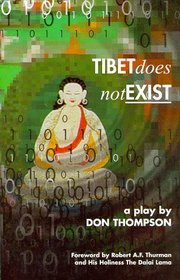Search -
Tibet Does Not Exist
Tibet Does Not Exist
Author:
In the fragmented, diverse world of modern academia, the universal truths have been boiled down into unfathomable, specialized texts no one understands. There are no longer philosophers, but specialists who dissect the works of others until whatever truth they once held is dead. Buton Rinpoche, a Tibetan Buddhist monk who fled from C... more »
Author:
In the fragmented, diverse world of modern academia, the universal truths have been boiled down into unfathomable, specialized texts no one understands. There are no longer philosophers, but specialists who dissect the works of others until whatever truth they once held is dead. Buton Rinpoche, a Tibetan Buddhist monk who fled from C... more »
ISBN-13: 9780966275803
ISBN-10: 0966275802
Publication Date: 2/28/1998
Pages: 103
Edition: 1
Rating: ?
ISBN-10: 0966275802
Publication Date: 2/28/1998
Pages: 103
Edition: 1
Rating: ?
0 stars, based on 0 rating
Publisher: Theater for Human Rights
Book Type: Paperback
Members Wishing: 0
Reviews: Amazon | Write a Review
Book Type: Paperback
Members Wishing: 0
Reviews: Amazon | Write a Review
Genres:
- Arts & Photography >> Performing Arts >> Theater >> General
- Literature & Fiction >> Dramas & Plays >> United States




